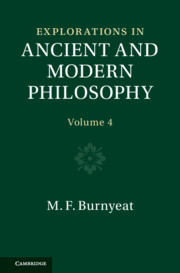Book contents
- Explorations in Ancient and Modern Philosophy
- Explorations in Ancient and Modern Philosophy
- Copyright page
- Contents
- Illustrations
- Preface
- Acknowledgements
- Abbreviations
- Introduction
- Part I Ontology and epistemology
- Chapter 1a Apology 30b2–4: Socrates, money, and the grammar of γίγνεσθαι
- Chapter 1b On the source of Burnet’s construal of Apology 30b2–4: a correction
- Chapter 2 Plato on how not to speak of what is not: Euthydemus 283a–288a
- Chapter 3 Platonism in the Bible: Numenius of Apamea on Exodus and eternity
- Chapter 4 Kinēsis vs. energeia: a much-read passage in (but not of) Aristotle’s Metaphysics
- Chapter 5 De Anima ii.5
- Chapter 6 Aquinas on ‘spiritual change’ in perception
- Chapter 7 Epistēmē
- Part II Physics and optics
- Bibliography
- Index locorum
Chapter 3 - Platonism in the Bible: Numenius of Apamea on Exodus and eternity
from Part I - Ontology and epistemology
Published online by Cambridge University Press: 24 March 2022
- Explorations in Ancient and Modern Philosophy
- Explorations in Ancient and Modern Philosophy
- Copyright page
- Contents
- Illustrations
- Preface
- Acknowledgements
- Abbreviations
- Introduction
- Part I Ontology and epistemology
- Chapter 1a Apology 30b2–4: Socrates, money, and the grammar of γίγνεσθαι
- Chapter 1b On the source of Burnet’s construal of Apology 30b2–4: a correction
- Chapter 2 Plato on how not to speak of what is not: Euthydemus 283a–288a
- Chapter 3 Platonism in the Bible: Numenius of Apamea on Exodus and eternity
- Chapter 4 Kinēsis vs. energeia: a much-read passage in (but not of) Aristotle’s Metaphysics
- Chapter 5 De Anima ii.5
- Chapter 6 Aquinas on ‘spiritual change’ in perception
- Chapter 7 Epistēmē
- Part II Physics and optics
- Bibliography
- Index locorum
Summary
Numenius (second century AD), the only witty Platonist after Plato himself, memorably described Plato as ‘Moses talking Attic’. He did not mean thereby to rate Eastern wisdom more highly than Platonic philosophy, as is sometimes suggested, but to recognise in the words ‘I AM THAT I AM’, spoken to Moses by the God of the Hebrews, an anticipation, unique in Eastern lore, of the conception Numenius championed of the Platonic first principle One or Good as Being itself. This paper proposes that his further exploration of that idea shows him to have construed the Timaeus account of such being as an eternal present, or in Boethius’s words ‘the complete possession all at once of an infinite life’, not as timelessness (the Timaeus interpretation advocated by Richard Sorabji). It is argued that this was both a correct interpretation of Plato’s text, and one shared in much subsequent ancient and medieval philosophy, including Plotinus, Augustine, and Aquinas. From our own human perspective, a present tense without past or future connections might be considered ‘a kind of logical torso’, a defective remnant of ordinary time. For Plato that human conception of present time is itself a mere image of eternity.
- Type
- Chapter
- Information
- Explorations in Ancient and Modern Philosophy , pp. 67 - 92Publisher: Cambridge University PressPrint publication year: 2022

